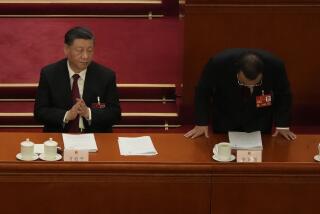China’s Ousted Party Chief to Reappear Today
- Share via
BEIJING — Former Chinese Communist Party chief Hu Yaobang will return to public life today for the first time since he was ousted from his job in the wake of student demonstrations last January.
A spokesman for the National People’s Congress, China’s Parliament, announced Tuesday that Hu will be among the 157 members of the congress’ leadership present today when Premier Zhao Ziyang delivers his annual speech to the opening session. Zhao’s speech is China’s version of a state of the union address.
Hu’s reappearance is intended to demonstrate the peaceful nature of China’s recent leadership changes. In recent weeks, Chinese leaders have grown increasingly concerned that these changes are being perceived overseas as a revival of the purges and bloody power struggles that took place under Mao Tse-tung.
No Major Shifts Seen
A spokesman for the National People’s Congress, Deputy Secretary General Zeng Tao, also told reporters Tuesday that there will be no major leadership changes during the 16-day session.
As a result, Zhao--who was named acting general secretary of the Communist Party after Hu’s ouster--will continue as both premier and acting party leader for at least another few months.
A knowledgeable Chinese official conceded Tuesday that Zhao might not keep both of these jobs indefinitely and said he anticipated that there might be leadership changes next September during a national congress of the Communist Party.
Hu, 71, served for more than four decades as an aide and confidant of Chinese leader Deng Xiaoping. In 1981, after Deng consolidated his control of the Communist Party, Hu took over as party general secretary with what he felt was a mandate to rejuvenate the party.
Clashes Within Party
But Hu clashed repeatedly with elderly leaders within the party and the People’s Liberation Army. His opponents fought a determined campaign to prevent Hu from getting into a position where he might take power after Deng, who is 82, either dies or retires.
After a series of student demonstrations for democracy last December, party leaders hastily called together what they termed an “enlarged” session of the Communist Party Politburo--a meeting attended by many party leaders who were not actually members of the Politburo.
At this session, held Jan. 16, Hu was forced to resign as head of the party. Since then, Deng has blamed him for what was called the “trend toward bourgeois liberalization” that led to the student protests.
After Hu’s resignation, there were unconfirmed reports that he had been hospitalized. At a press briefing for reporters Tuesday, Zeng said, “So far as I know, Hu Yaobang’s health is not bad.”
Reforms Will Continue
Over the last two months, Deng and Zhao have been pressing the theme that China’s economic reforms will continue and that the campaign against bourgeois liberalization is being confined to political and ideological circles inside the Communist Party.
But there were hints of the continuing divisions within China’s top leadership during a preliminary meeting of the National People’s Congress membership Tuesday.
Chen Pixian, a conservative leader who is vice chairman of the congress’ standing committee, told China’s lawmakers that “we should take practical measures to further promote democracy in the country’s political, economic and cultural life in a guided, planned way. . . .”
The use of the word planned can be interpreted as a reference to the importance of centralized state planning. One of the goals of the economic reform program carried out under the leadership of Deng and Zhao has been to de-emphasize state planning and to free up a greater share of the economy to market forces.
More to Read
Sign up for Essential California
The most important California stories and recommendations in your inbox every morning.
You may occasionally receive promotional content from the Los Angeles Times.













